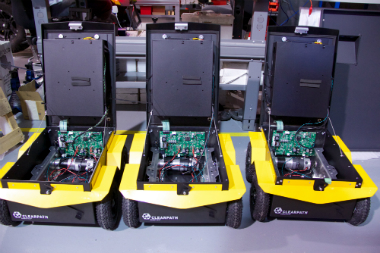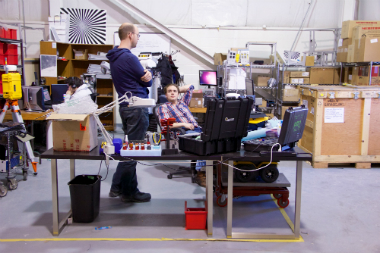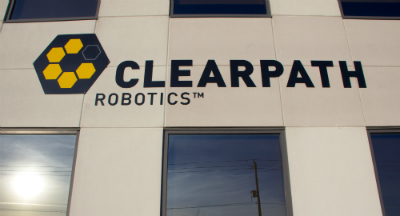So you want to build a billion-dollar company. But what else do you believe in?
For the team at Clearpath Robotics, this question has involved far more than deciding which local charities to support or which community activities to promote.
The question of values goes to the heart of Clearpath’s business – building autonomous robots for military and non-military customers – and has thus prompted the company to consider how its products should, and should not, be used.
As a result, Clearpath became the world’s first company to join the movement to ban lethal autonomous weapons, more commonly known as killer robots, when it announced its stand to the world last summer.
From a publicity perspective, the move was certainly effective at putting the small but fast-growing Waterloo Region company on the world’s radar.
More than that, it reiterated the original values that brought Clearpath’s co-founders – Matthew Rendall, Ryan Gariepy, Patrick Martinson and Bryan Webb – together in 2008 to work on a project as mechatronics engineering students at the University of Waterloo.
The project, for a U.S. Army-funded competition to reduce war casualties, was to develop robots that could clear minefields – hence the name, Clearpath – without risking lives.
Six years later, with an 80-member team that’s set to grow to 140 over the next 18 months, Clearpath has emerged as the ethical standard-bearer for an industry trying to balance world-changing technological advancements against the implications of potential misuse.
The mounting concern around the ethics of artificial intelligence technology - self-driving cars, drones, robots and the like - made me curious about the company's decision to take a stand, and what other tech companies might learn from it.
I sat down this week with Gariepy, Clearpath's Chief Technology Officer, to find out more about the decision and what it has meant to the company.
Q – Tell me what led up to Clearpath’s pledge last summer to never build a “killer robot.”
A – As you can imagine, we have a lot of people on our team who very much not only care about building robots, but they also care about what sort of impact that has on society.
So, talking about drones, about this potential for lethal systems, about self-driving cars – any use of robotics has been a thing that we would discuss at the lunch table, or at the pub after work.

The compact Jackal is Clearpath’s latest robotic vehicle, designed in collaboration
with the U.S. Army Research Laboratory. (Communitech photo: Anthony Reinhart)
That started [when the co-founders were] in school, and that continued throughout the founding of the company. It’s something we still do now.
What we thought with this killer robots topic was that it was becoming a real possibility, and there were various lawyers and ethicists and philosophers and scientists all saying that this is a problem, and we know the technology is there to allow you to do it poorly, but no one was taking it seriously.
So, we thought it would be beneficial to actually step up and take the stand, and say, ‘We are a company, and we have something to lose here, and aside from money, there’s also our reputation.’ We’re going take some of the time we have, and some of the attention we have, and spend that on making sure people pay attention to this; that they look at it and say that a private company is starting to take this seriously. And not only any private company, but a company which derives revenue from working with the military.
Q – Given that you already had military clients, was there any apprehension about alienating them or other clients by taking this kind of a stand?
A – We did discuss it, but in the end, there are two things we looked at.
First, overall, we think it’s the right thing to do. We have military clients and we have non-military clients, and though we could lose some revenue if we lost all our military clients, the question is, is it the right thing to do? Do we want to live in that sort of world?
And the second thing is, is a customer with that sort of prejudice someone that we want to work with? Someone who’s willing to say, ‘You guys are taking a stand based on beliefs and ethics and we’re not going to buy something from you’ – is that a customer we’re going to even want to work with?
I don’t think so.
Q – What was the reaction from customers when you came out with this announcement?
A – In general, reaction from customers, from prospective employees, from a number of other people reaching out to us from the community, both locally and internationally, has been quite positive.
There are a lot of people in the military themselves who know of the difficulty, and what is actually [at stake], when you’re saying ‘Let’s have autonomous systems make decisions on taking lethal force.’
They know better than most people the complexity of making those decisions, and they know that we can’t [even] get this right for humans all the time. They know what could happen in the battlefield, for instance.
So, the majority of people in the military that we’ve spoken with have been favourable to this stance.
Q – What happens if someone modifies one of your robots to make it into a killer robot?
A – That’s one of the reasons we took this stance, because we build technology that other people can build upon. We build both hardware and software which allows people to build autonomous vehicles, to build smart vehicles.
Because of that, we can never have ultimate control over what our products are used for. So, we felt that speaking up like this would really decrease the chance that we’d turn on the news in the morning and that’s what we’re going to see.
You’ve seen all the news about drones recently. Yesterday, there was news of a small drone crashing on the White House lawn.
There’s a very small difference between a robot which is completely safe and doing good, and a robot which is deadly.
Q – So you’re disclosing to the world that you’re against killer robots, so that if someone were to adapt your product and misuse it, the world would know it wasn’t you?
A – This is not as much about covering ourselves. We would rather, if we put this sort of stuff in place, then hopefully it just doesn’t happen. That’s the goal.
The difference between a robot which is safe and doing good work, and a robot which is a killer robot, is very small, so that’s one problem. The other problem is, the difficulty of building a robot which has the judgment of an experienced soldier is inordinately high.
Q – Given the praise you received for taking this stand, what impact has this decision had on the company?
A – I’m certainly doing a lot more travelling because of it.
I was just speaking with a number of people who do this sort of planning with the Canadian Forces.
I’ll be speaking at the Red Cross conference on International Humanitarian Law in March, and I’ll likely be speaking at the United Nations in April in Geneva.
I’ll actually have to be turning down some speaking engagements simply because my job is building robots, not speaking about them. But we’re still, as a company, happy to invest my time in trying to take some action; trying to speak out a little bit about this.

Shared values: Clearpath’s stand against killer robots reflects the will of the company’s
80 team members, Ryan Gariepy says. (Communitech photo: Anthony Reinhart)
It’s also been very good for our team to see some of these benefits that you don’t see as much in companies these days; that it’s more than about having a job, and it’s more than about being paid and doing interesting work. It’s also about having a group of people you can work with, who aren’t necessarily the same, but have some shared beliefs that everybody can stand behind, and have this organization that can amplify people’s beliefs.
Q – That leads into my next question. There are a lot of technology companies out there with varying degrees of commitment to moral causes; some are actually amoral and seem to exist solely for their own advancement. Why do you feel it’s important for tech companies to stand for something beyond simply building product and making a profit?
A – Some look at a company and say the purpose of the company is to exert the will of its shareholders.
But, for everybody who works here, everybody has options or stock in the company, and the will of the shareholders is not just to make money; it’s also, what do we want to build? We want to change the world; what do we want to change the world to?
For us, unlike a number of other companies, we have these very real questions to wrestle with. And I think there are other companies in the region or in the area who might have similar thoughts on, let’s say, privacy or encryption.
I think those companies should actually have a stance.
I’m not trying to make the decision for these companies whether they are pro-encryption or not; everybody has different stances. But what is the belief of your company?
At the same time, we are in a situation where everybody does generally believe the same thing, so the company can take that stance.
There are other things we’ve been discussing where the company can’t necessarily agree, so the company as a whole maybe can’t make that statement.
But if your company does believe in something as a whole, put it out to the world.
Q – What would you say to other entrepreneurs in this region who may be grappling with whether to similarly state their beliefs on an issue?
A – I mean, it’s a lot easier when you’re one person. We’re probably at about 80 people right now at Clearpath, so it starts to get harder and harder [in agreeing on] what the company believes in.
Now we’re very well-known on this topic, so by publicly broadcasting that, what we’re saying is, join our company with whatever background you want – age, gender, marital status, race – but if you want to join a robot company and build this sort of [lethal robotic] technology, that’s something you should be aware of.
If you’re the kind of person who wants to go to work in a suit every day and write code, you don’t go and work at Google; they’re much more casual.
So, [the anti-killer robots position] is part of our culture, and we want to broadcast that.
I would say, if you’re an entrepreneur, a one-person shop, and there’s something you feel really strongly about, then putting it out there is important.
If you talk to a lot of people about building a business, they say that your values mature over time, and that you want to hire with your values in mind.
We look at this [stand] as part of what relates to our values. It’s not part of the values of day-to-day business, but it is very related to our values, and putting it out there means that you’re probably not going to get someone who counters it applying to the company.
Q – Do you think Waterloo Region is any more disposed to taking these kinds of stands than any other tech community, such as Silicon Valley, would be?
A – I’ve never thought about that before.
I certainly don’t believe that our taking a stance has slowed us down in our mission to change the world with robotics. I mean, it’s taken some time out of our lives, but it’s different from work.
I haven’t looked at what statements some companies have made and some companies haven’t. I know a good example would be Google, in its original investor prospectus, put in, ‘Don’t be evil.’
That was an example of a company in the Valley taking what they believed to be a moral stand at the time.

Clearpath Robotics’ facility on Strasburg Road in Kitchener has room to grow as its team
expands to an estimated 140 over the next 18 months. (Communitech photo: Anthony Reinhart)
So I believe there’s nothing specific to our region or the Valley that would make that the case. A company that isn’t located in the Valley can still be open to the concerns of the wider world around it. Some aren’t, but a lot of them are.
Moreover, I would say Clearpath has always been a company which has tried to solve problems with robotics for the world, not just for ourselves, not just for tech companies, not just for a privileged class.
We’re trying to solve the dull, dirty and dangerous jobs with robotics, and that means you have to pay attention to the broader world around you.
View from the ‘Loo looks at the issues, people and events that shape Waterloo Region’s technology sector.

